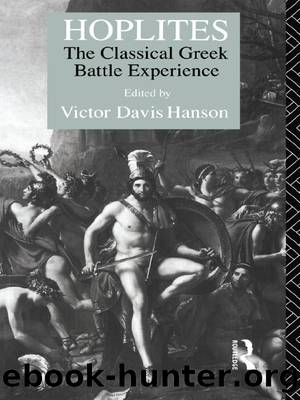Hoplites by Hanson Victor Davis

Author:Hanson, Victor Davis.
Language: eng
Format: epub
Publisher: Taylor & Francis (CAM)
Published: 2011-09-08T00:00:00+00:00
II
The age of the fully developed hoplite phalanx extends to the battle of Chaeronea (338 BC). So far this study has traced chronologically the development of the phalanx and the combat role of its commander from a period of pre-state warrior chieftains in Homer to the institutionalized positions of Spartan king and Athenian strategos. The relative abundance of evidence for the fifth and fourth centuries now necessitates a more analytical approach to the transition from phalanx commander to the Hellenistic/Roman battle managerâessentially a change of emphasis from the warriorâs physical leadership to the verbal and mental requirements of a commanding general. Although the term strategos rapidly spread throughout the Greek world in the fifth century,76 the available primary sources (predominantly Athenian) permit a glance at the social and intellectual milieu of the transition at Athens, which probably applied in varying degrees to many other poleis of the fifth and fourth centuries.
It is important to emphasize the newness of the concept of the strategos. Initially the peopleâs election of these magistrates mattered little, as aristocrats continued to dominate the strategic board (Themistocles being the only notable exception) until the death of Pericles. The generals as individuals continued to receive the lionâs share of glory for military success from the Persian wars to the end of Cimonâs ascendency (461 BC), when with the establishment of a public funeral for the war dead and its attendant epitaphios logos in 464 BC, anonymity of individualsâ contributions and a collective glorification of the city became the norm.77 This equal distribution of glory approximates to a new wave of democratic reforms from 462 BC on. Yet young aristocrats could be confident that their claim to innate arete, fortified by gymnastic training and equipped with instruction in Homer and archaic poets, provided them with âthe right stuff for leadership, such as their fathers and grandfathers, the men of Marathon, had demonstrated.78 An âold oligarchâ could boast that even in a democracy the people craved personally profitable magistracies, but were content to leave the important matters of generalship to the most capable men (Ps.-Xen., Ath. Pol, 1.3).
As the progress of Athenian democracy and imperialism converted the Delian League into Empire, the sophistic movement attempted to revolutionize education, turning knowledge into a collection of technai, Homer into an encyclopedia, and crafty rhetoric into the key to a political career. War itself became a techne, when first maintenance of the Empire, then the Peloponnesian War (431â04 BC) reinforced the military functions of Athenian strategoi (also the chief civil magistrates after 487/6 BC) and demanded increasing professionalism. Until his death in 429 BC Pericles the aristocrat, friend of sophists and skillful strategist, astutely guided Athenian democracy, but his death left a power vacuum in Athenian politics, exacerbating an issue probably already debatedâwho should be elected a strategos? How to define the good general?
In a sense the debate had raged since 501/500 BC, but conservatives first demonstrably raised military competence as a criterion for the strategos in response to high casualties after
Download
This site does not store any files on its server. We only index and link to content provided by other sites. Please contact the content providers to delete copyright contents if any and email us, we'll remove relevant links or contents immediately.
The Secret History by Donna Tartt(16747)
The Social Justice Warrior Handbook by Lisa De Pasquale(11514)
Thirteen Reasons Why by Jay Asher(7850)
This Is How You Lose Her by Junot Diaz(5839)
Weapons of Math Destruction by Cathy O'Neil(5091)
Zero to One by Peter Thiel(4878)
The Myth of the Strong Leader by Archie Brown(4816)
Promise Me, Dad by Joe Biden(4489)
Beartown by Fredrik Backman(4479)
How Democracies Die by Steven Levitsky & Daniel Ziblatt(4461)
Stone's Rules by Roger Stone(4448)
The Fire Next Time by James Baldwin(4390)
100 Deadly Skills by Clint Emerson(4120)
A Higher Loyalty: Truth, Lies, and Leadership by James Comey(4071)
Rise and Kill First by Ronen Bergman(4059)
The David Icke Guide to the Global Conspiracy (and how to end it) by David Icke(3929)
The Farm by Tom Rob Smith(3903)
Secrecy World by Jake Bernstein(3818)
The Doomsday Machine by Daniel Ellsberg(3768)
